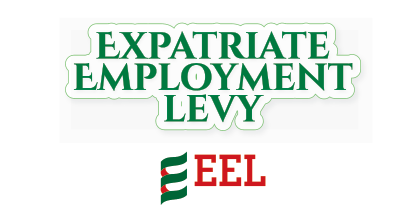The Federal Government of Nigeria (FGN) recently introduced a significant change for companies employing expatriate workers on February 27, 2024, with the launch of the Expatriate Employment Levy (EEL). The EEL which is a government-mandated contribution aims to strike a balance between attracting foreign expertise to fuel economic growth and fostering development of the domestic workforce. As such, companies employing expatriates, especially those holding work permits exceeding six months or those filling specific quota positions will be required to pay the EEL annually.
The EEL seeks to achieve a two-pronged approach. Firstly, it aims to create a more skilled domestic talent pool. By incentivizing companies to invest in training and development programs for Nigerian employees, the levy hopes to empower Nigerian companies to fill skilled positions currently held by expatriates. Secondly, the EEL addresses concerns about potential imbalances in the job market. By encouraging both local and international companies operating in the country to consider qualified Nigerians alongside expatriates for skilled roles, the levy aims to create fairer competition and ensure opportunities for Nigerians seeking career advancement.
According to the EEL guideline released by the FGN, the levy amount varies depending on the expatriate’s position. Companies will pay a higher rate of $15,000 per year for expatriate directors compared to $10,000 for other expatriate categories. The levy payment process is streamlined through an online portal, with a deadline set for the last day of February each year. This is to be supervised by the Nigeria Immigration Service (NIS) to ensure compliance. Furthermore, obtaining or renewing expatriates’ work/residence permits now hinges on the EEL compliance.
While the EEL seeks to address long-term development goals, some concerns have been raised. Companies, especially those operating in sectors reliant on local currency, express apprehension about the levy’s potential to hinder their ability to attract and retain essential foreign talent. The levy might make hiring expatriates more expensive, potentially impacting their competitiveness in the global market. Additionally, there’s a slight possibility of a domino effect, with other countries implementing similar measures in response. This could create a complex international hiring landscape with additional bureaucratic hurdles.
The long-term impact of the EEL on Nigeria’s economy and job market remains to be seen. Addressing issues like diaspora remittances and fostering a globally competitive talent market through improved education and training programs may play a crucial role in mitigating potential economic challenges. Businesses and expatriates operating in Nigeria will need to adapt to this new landscape by understanding the levy’s purpose, scope, and potential implications. By effectively navigating this change, companies can continue to leverage foreign expertise while simultaneously contributing to the development of a skilled Nigerian workforce.





